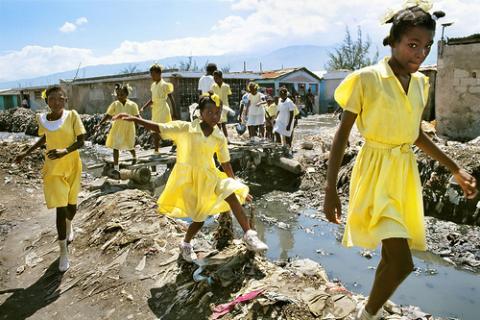Haiti: smaller NGOs prove most effective

Large NGOs have struggled to deliver much needed relief to disaster-stricken Haitians. By contrast, the many smaller MONGOs (My Own NGO) that have sprung are proving most effective in reaching those in need. These organisations are providing hospitals, education, micro-finance and infrastructure that could help Haiti leap-frog the technology gap. By Evert Bopp.
Looking back on a year of relief aid being poured into Haiti it's hard not to become cynical about the effectiveness of the traditional means of providing disaster relief. Thousands of boat and plane loads of food, medical supplies and other equipment have been unloaded on this Caribbean island and billions of dollars have been donated and pledged. Still, close to a million displaced people live in tents and under sheets of plastic. Cholera and other diseases still ravage the population and the most basic services and infrastructure are not available. So where did it all go wrong?
There are a wide variety of causes some external to Haiti but certainly a few that are internal issues. First of all the traditional model of aid as supplied by large NGO's is hopelessly broken; the larger NGO's have become bureaucratic and top-heavy monstrosities. While they have large resources that can be transported to the disaster stricken area quickly, the actual distribution of these resources to where they are needed is where it all falls down. By their sheer size and multi-layered structure they're unable to take a pro-active approach.
Another issue is the massive overheads. The cost of transporting teams out to Haiti, the cost of what is classified as acceptable accommodation and the huge cost of securing their operations mean that a large amount of funding is already used up before the first cent of aid is supplied. The net result of this is that while several large NGO's are present in Haiti, the actual aid delivered compared to the cost has been relatively small.
In contrast, Haiti has seen a large growth in so-called MONGO's (My Own NGO), small volunteer organisations that have a grass-roots approach and whose work is surprisingly effective. Team Rubicon is a small group of ex-military medical personal who flew into Haiti within days of the earthquake and got straight to work. Renewal4Haiti is an organisation that is building a new hospital in Leogane and is also planning an education and training programme for Haitians.
While these organisations have relatively small budgets, their effectiveness is achieved because almost every cent they receive is spent in delivering actual aid. These small organisations have also shown themselves adept in using social media as a means of communication, fundraising and publicity tool. Their actions are well publicised via Facebook pages and Twitter is used both as a communications tool and as a means of publicising their actions.
Technology is also used heavily as a means of providing aid and safety and as a tool in rebuilding the country and improving education and the economy. By implementing technology tools in learning and economic development, Haiti might be able to leapfrog the development gap. Organisations such as Ushahidi, Nethope, Inveneo and Haiti Connect are all contributing to this goal. In addition, micro-lending is spreading across Haiti with Fonkoze being the largest provider. This makes small loans available to Haitians enabling them to start a new business or improve an existing one. This system has already proven to work much better than the traditional banking model.
Another area in Haiti that is in need for a radical reform is political system. The current system is a top down one whereby a very small group of select people determine the way the country is run. That would be fine if this was done effectively but unfortunately that isn't the case. As the recent shambles of an election has shown, the current political class is interested only in protecting its own interests while the largest part of the population suffers.
This has lead to an endemic corruption whereby every interaction with a government person requires the greasing of palms. The worst example is customs officers insisting on high import duties on aid supplies and food. This system needs to change and the questions is whether this will need to happen before we see change in other areas or if the creation of a more educated and prosperous Haitian population will bring along a change in the political system.
Considering the above one might think that Haiti's future is dark and uncertain. Less is true in my opinion. Change will come and it will be brought about by the sheer strength, resilience and pride of the Haitian people. This is a nation that has suffered for decades if not centuries but still refuses to hang its head. As perverse as it might sound, the 2010 earthquake might well have brought the long-needed seismic impetus to change and improve Haiti. By having the eyes of the world upon them, Haitians have become aware of the need for change. More and more Haitians living in the US and further afield are taking an interest and becoming involved in rebuilding and improving their country. This influx of money and skills is already having an impact and the first glimmers of hope for Haiti are appearing.
Evert Bopp founded Haiti Connect with his wife Kate Bopp
Photo: SCHOOL CHILDREN, HAITI. Port-au-Prince, Cite Soleil shanty town. Children pick their way along open sewers, immaculately dressed, to tiny schools in hot tin huts.
By Mark Edwards / Still Pictures on Flikr
